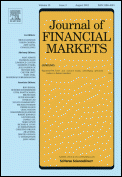
JOURNAL OF FINANCIAL MARKETS
Scope & Guideline
Illuminating the complexities of financial markets.
Introduction
Aims and Scopes
- Market Efficiency and Price Discovery:
Research often investigates how information and trading strategies impact market efficiency and the mechanisms of price formation, including the role of liquidity and trading costs. - Behavioral Finance and Investor Sentiment:
The journal addresses the influence of psychological factors and investor behavior on market movements, including studies on herding behavior, sentiment analysis, and the effects of media. - Regulatory Impact and Market Structure:
Papers frequently explore how regulatory changes and market structure (e.g., dark pools, high-frequency trading) affect market outcomes and participant strategies. - Quantitative Methods and Machine Learning:
The use of advanced quantitative methods, including machine learning, is a growing focus, with studies applying these techniques to predict market movements and analyze trading strategies. - Global Market Dynamics:
Research includes comparative analyses of international markets, examining how global events, economic indicators, and cross-border trading practices influence local market behavior. - Risk Management and Derivative Markets:
The journal publishes work on the relationship between risk management practices, derivatives trading, and their implications for market stability and investor behavior.
Trending and Emerging
- Algorithmic and High-Frequency Trading:
Recent publications highlight the growing role of algorithmic trading strategies and their impact on market efficiency, participant behavior, and regulatory considerations. - Machine Learning Applications:
There is a burgeoning interest in applying machine learning techniques to financial data analysis, with research focusing on predictive modeling and risk assessment. - Impact of Information Disclosure:
Emerging studies examine the effects of information dissemination on market dynamics, particularly how private information and news affect trading behaviors and price movements. - Sustainability and Climate Risk:
An increasing number of papers address the implications of climate risks on financial markets, reflecting a broader trend towards integrating sustainability into financial analysis. - Investor Behavior in Crisis Situations:
Research is increasingly focused on understanding how investor sentiment and behavior change during crises, such as the COVID-19 pandemic, highlighting the relevance of psychological factors in trading. - Cross-Market Interactions:
The exploration of interactions between various asset classes and markets is gaining traction, as researchers seek to understand the interconnectedness of global financial systems.
Declining or Waning
- Traditional Fundamental Analysis:
There appears to be a waning interest in purely fundamental analysis approaches, with more emphasis now placed on behavioral finance and quantitative methods. - Static Models of Market Behavior:
Research employing static models to analyze market behavior is becoming less common, as there is a shift towards dynamic models that account for changing market conditions and participant behaviors. - Historical Financial Events Analysis:
Studies focused solely on historical events without linking them to current market implications have decreased, as contemporary relevance and predictive insights take precedence. - Microstructure Studies in Isolation:
While market microstructure remains a critical area, papers focusing exclusively on microstructure without integrating broader market context or real-world applications are less frequently published.
Similar Journals
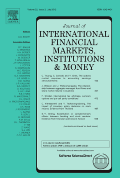
Journal of International Financial Markets Institutions & Money
Innovating Research in International FinanceThe Journal of International Financial Markets, Institutions & Money, published by Elsevier, serves as a leading platform for the dissemination of high-quality research in the fields of finance, economics, and econometrics. With an impressive impact factor reflected in its status as a Q1 journal in both categories for 2023, it ranks among the top journals, positioned at #47 out of 317 in Finance and #111 out of 716 in Economics. This journal offers a unique focus on the interplay between financial markets and institutions on a global scale, making it an essential resource for scholars, practitioners, and students alike. The journal welcomes innovative theoretical, empirical, and applied research, contributing to an exciting dialogue that shapes the future of international finance. For researchers looking to publish their findings, this journal is committed to rigorously engaging with contemporary financial phenomena, positioning itself as a vital cornerstone of academic and professional discourse.
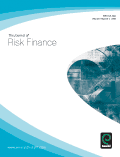
Journal of Risk Finance
Pioneering research for a secure financial future.The Journal of Risk Finance, published by Emerald Group Publishing Ltd, is a premier academic journal dedicated to advancing the understanding of risk management and finance practices since its inception in 1999. With a strong foothold within the Q2 rankings in both Accounting and Finance categories, it proudly holds a significant place in the scholarly landscape, ranking #54 out of 317 in the Scopus Economics and Finance category, placing it in the 83rd percentile. The journal aims to facilitate the exchange of innovative research and practical insights, catering to an audience of researchers, professionals, and students eager to explore contemporary issues in risk finance. While not an open access journal, it provides numerous access options, ensuring that essential findings reach a broad readership. Set in the United Kingdom and covering publications up to 2024, the Journal of Risk Finance continues to be an indispensable resource for those committed to this critical field.
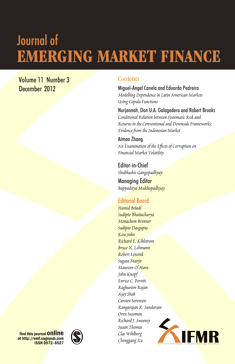
Journal of Emerging Market Finance
Unveiling Trends in Emerging Market FinanceThe Journal of Emerging Market Finance, published by SAGE Publications India Pvt Ltd, is a premier academic journal that serves as a vital resource for researchers, professionals, and students in the fields of finance and economics. Established in 2002, this journal focuses on the multifaceted dynamics of emerging market economies and their financial systems. With an ISSN of 0972-6527 and an E-ISSN of 0973-0710, it has garnered attention with its respectable Q3 rankings in both the Economics and Econometrics and Finance categories, reflecting its commitment to high-quality research. Despite its limited open-access options, the journal remains a significant platform for scholarly discussions, providing insights on emerging financial instruments, market behaviors, and economic policies in developing economies. As a continuously evolving publication, it aims to bridge the gap between theory and practice, promoting an understanding of the complexities faced in these vibrant markets, ultimately serving the academic community with relevant and impactful research until 2024 and beyond.
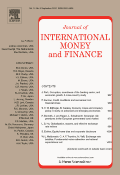
JOURNAL OF INTERNATIONAL MONEY AND FINANCE
Unveiling insights into international finance trends.JOURNAL OF INTERNATIONAL MONEY AND FINANCE is a premier scholarly publication dedicated to advancing the understanding of international finance and monetary economics. Published by Elsevier Science Ltd, this esteemed journal has been disseminating critical research since its inception in 1982 and will continue to contribute to the field through 2024. With a strong international presence and headquarters in the United Kingdom, the journal boasts an impressive collection of articles that explore significant trends, challenges, and innovations in the areas of economics and finance. Recognized for its impact, it ranks in the top quartile (Q1) in both the Economics and Econometrics and Finance categories as of 2023, signifying its influence and relevance among peers. Researchers, professionals, and students in these disciplines can benefit from the journal's rigorous peer-review process, ensuring high-quality scholarly outputs. Though not currently an open-access journal, it provides various subscription options to foster access to groundbreaking research in the financial ecosystem.
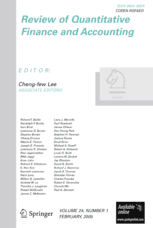
Review of Quantitative Finance and Accounting
Exploring the Intersection of Finance and AccountingThe Review of Quantitative Finance and Accounting, published by Springer, is a distinguished academic journal that has been at the forefront of scholarly discourse since its inception in 1991. With an ISSN of 0924-865X and an E-ISSN of 1573-7179, this journal specializes in the interdisciplinary realms of accounting and finance, particularly emphasizing quantitative methodologies and their applications in real-world scenarios. With an impressive track record reflected in its 2023 rankings, it sits in the Q2 category across key fields such as Accounting, Business Management, and Finance, demonstrating its relevance and influence within these domains. Although it operates without an Open Access option, the journal's content remains vital for researchers, professionals, and students aiming to deepen their understanding of quantitative approaches in finance and accounting contexts. The Review of Quantitative Finance and Accounting stands as an essential resource for advancing knowledge and fostering innovation within these critical disciplines.
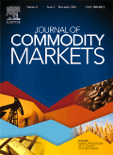
Journal of Commodity Markets
Connecting Scholars to the Heart of Commodity MarketsThe Journal of Commodity Markets, published by ELSEVIER, is a leading academic platform dedicated to the multifaceted field of commodity markets, encompassing various aspects of economics, finance, and econometrics. Established in 2016, this journal has rapidly gained recognition, reflected in its respectable impact factor and Scopus rankings, which place it in the Q2 category for both Economics and Finance, situating it among the top 20% of journals in these areas. With an accessible ISSN (2405-8513) and E-ISSN (2405-8505), the journal appeals to researchers, professionals, and students alike, providing a rich resource for understanding the dynamics of commodity trading, market analysis, and economic implications. Although it does not currently offer open access, its rigorous peer-review process ensures high-quality publications that contribute significantly to the discourse in commodity market studies. Housed in the Netherlands, the journal uniquely positions itself to influence and reflect on global commodity market trends up to the present year, 2024.
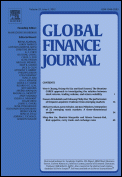
Global Finance Journal
Advancing knowledge in global finance.Global Finance Journal is an esteemed periodical published by Elsevier, dedicated to the dynamic fields of finance and economics. With an impressive history spanning from 1989 to 2024, this journal holds a significant position in the academic community, boasting a Q1 quartile ranking in both Economics and Econometrics, as well as Finance, as of 2023. It is highly regarded in Scopus rankings, placing 40th out of 317 in Finance and 99th out of 716 in Economics and Econometrics, demonstrating its influence and reach among researchers and practitioners alike. Although not an open-access journal, the Global Finance Journal provides rigorous peer-reviewed articles that explore critical issues, advance theoretical frameworks, and address practical applications in global finance. As such, it serves as a vital resource for researchers, financial professionals, and students aiming to deepen their understanding of economic phenomena and contribute to the ongoing discourse in these vibrant disciplines.
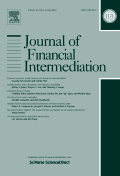
JOURNAL OF FINANCIAL INTERMEDIATION
Delivering cutting-edge research for financial innovation.JOURNAL OF FINANCIAL INTERMEDIATION, published by Academic Press Inc Elsevier Science, is a premier academic journal dedicated to the study of financial intermediation. First established in 1990, this esteemed journal has firmly positioned itself within the top quartile (Q1) of rankings in both Economics and Econometrics as well as Finance, reflecting its significant impact and relevance in the field. With an impressive Scopus ranking of #31 out of 317 in Finance and #74 out of 716 in Economics and Econometrics, it caters to a diverse audience, including researchers, professionals, and students interested in the intricate dynamics of financial markets and institutions. While the journal does not currently offer open access, it remains a vital resource for disseminating cutting-edge research and insights that drive innovation and inform policy-making in the financial sector. With a commitment to maintaining high academic standards, the JOURNAL OF FINANCIAL INTERMEDIATION continues to serve as an essential platform for advancing knowledge in financial theories and practices.
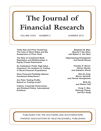
JOURNAL OF FINANCIAL RESEARCH
Navigating the Complexities of FinanceThe JOURNAL OF FINANCIAL RESEARCH, published by WILEY, stands as a pivotal platform for disseminating innovative research in the fields of finance and accounting since its inception in 1978. With an ISSN of 0270-2592 and an E-ISSN of 1475-6803, this journal aims to address contemporary challenges and trends within the financial research landscape. It has achieved notable recognition, being placed in the Q2 category for both Finance and Accounting in the 2023 rankings, signifying its relevance and impact within the academic community. Although it does not currently offer open access, the journal is accessible through various academic databases, catering to a diverse audience of researchers, professionals, and students keen on advancing their knowledge and understanding of financial systems and methodologies. With an evolving scope that encompasses empirical studies, theoretical frameworks, and practical applications, the JOURNAL OF FINANCIAL RESEARCH is committed to contributing valuable insights into the complexities of financial practices and policies.

Asia-Pacific Financial Markets
Unveiling Insights into Regional Financial TrendsAsia-Pacific Financial Markets is a distinguished academic journal published by SPRINGER, dedicated to advancing the field of finance research in the Asia-Pacific region. With an ISSN of 1387-2834 and an E-ISSN of 1573-6946, this journal fosters scholarly discourse on contemporary financial markets, investment strategies, and economic policy implications. Situated within the Q3 category in Finance for 2023, it ranks #140 out of 317 in the Scopus database, reflecting its growing significance and impact within the financial research community, as evidenced by its 55th percentile ranking. Since its inception in 1996, the journal has served as a pivotal platform for researchers, professionals, and students alike, featuring rigorous empirical studies and theoretical frameworks that address emerging financial trends and challenges. While it operates under a subscription model, the journal's comprehensive scope and commitment to high academic standards make it an essential resource for anyone looking to deepen their understanding of finance in the dynamic Asia-Pacific landscape.